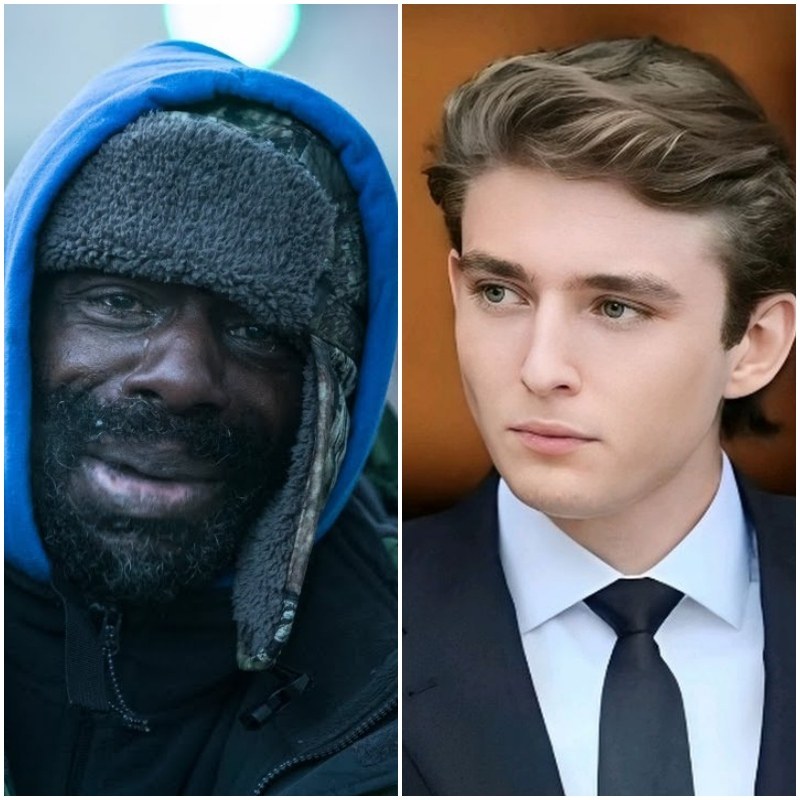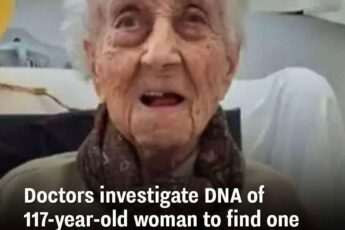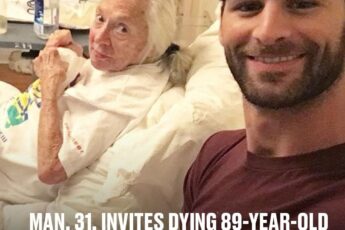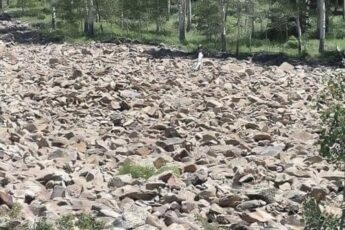It is often said that even the smallest gestures can spark change in ways no one expects. For James Walker, a 62-year-old homeless veteran enduring the brutal chill of a New York winter, that moment came with a simple plea: “Could you spare a dollar?” He had asked it quietly, almost reluctantly, his voice rough from the cold air and lack of food. What he didn’t know was that the young man he had approached was Barron Trump, the youngest son of former President Donald Trump. What followed wasn’t just an act of generosity—it was a chain of events that would alter the trajectory of James’s life and leave an imprint on everyone who heard about it.
James hadn’t always been on the streets. Just eight months earlier, his life looked entirely different. He worked the overnight shift as a security guard in the Bronx. The pay wasn’t much, but it was enough to cover rent for his small one-bedroom apartment, utilities, and the occasional hot meal at his favorite diner. Life wasn’t luxurious, but it was stable. Then the dizzy spells began. At first, he brushed them off, chalking them up to exhaustion. But soon, they became too frequent to ignore. A doctor’s visit confirmed what he feared: chronic heart failure. With his health declining, he could no longer keep up with the demands of his job. Slowly, the bills stacked up. Rent went unpaid. One by one, the little securities of life slipped away.
By January, everything James owned fit inside a fraying backpack. His “bed” was a flattened cardboard box tucked near the subway station. Each night, he layered old newspapers over himself, praying they would hold in some warmth. The nights were the worst—the sharp wind cut through his worn jacket, and the concrete beneath him stole whatever heat his body tried to hold. Hunger gnawed at him constantly. He hadn’t eaten in nearly two days, save for a stale granola bar someone had dropped into his hand. All he had left was 27 cents in his pocket and the memories of a life once filled with love.
The loss of his wife, Sarah, and their young son, Michael, in a tragic car accident ten years ago was a wound that never healed. They had been his world, his reason for pushing forward. He often whispered promises to them in the quiet of the night—that he would live with dignity, that he would never fall so low as to beg. But the cold had stripped away his pride, and hunger pushed him past his limits.
That morning, the subway station bustled with life. Commuters hurried past in expensive coats, clutching steaming cups of coffee, headphones in, eyes glued to their phones. No one noticed the man huddled against the wall, shivering under a tattered blanket. James sat quietly, shoulders hunched, invisible in a sea of people. He had grown used to being unseen.
Then something unusual caught his attention.
The crowd seemed to shift. A perimeter formed. James recognized the signs immediately—the sharp, efficient movements of trained security. Two men scanned the street with watchful eyes, one walked slightly behind, hand poised near his earpiece. He had seen this choreography before during his years in the military. His instincts told him someone important was coming through.
And then he saw him.
Tall, composed, and familiar, the young man walked between the guards with a quiet seriousness uncommon for his age. James blinked, realization dawning. It was Barron Trump. The resemblance to the family he had seen so many times on television was unmistakable. But it wasn’t the name that struck James in that moment—it was the way the young man carried himself. Something about his calm presence tugged at memories of Michael, his own son. Michael had once been like that: thoughtful, observant, respectful beyond his years. The resemblance, whether real or imagined, stirred something deep inside James.
His throat tightened. He hadn’t planned to speak. For days he had remained silent, only nodding when strangers passed, too weary to ask for help. But now, as Barron drew closer, a flicker of hope broke through the despair. Perhaps it was instinct, perhaps it was the ghost of his son nudging him, but James found himself slowly rising to his feet. His knees cracked, his legs wobbled under his weight, and he winced from the effort.
The security team immediately noticed. One man’s eyes narrowed, his hand brushing his coat as though ready to act. James froze, lifting his hands slightly to show he meant no harm. His voice came out hoarse, barely audible above the rumble of the city.
“Young man,” he said, his words trembling in the cold air, “could you spare a dollar?”
For a moment, there was silence. The world seemed to pause. Commuters kept walking, but in James’s mind, everything narrowed to that single moment. He felt exposed, vulnerable, his dignity balanced on the edge of a stranger’s response.
Barron stopped. His security shifted uneasily, but he held up a hand, signaling them to stand down. The young man’s eyes met James’s, and in that instant, the veteran saw something unexpected—compassion. Not pity, not judgment, but a genuine spark of empathy. It was the look of someone who saw him not as another nameless homeless man on the sidewalk, but as a human being.
What happened next stunned everyone. Instead of brushing past, instead of offering a polite smile or dropping a dollar without a word, Barron stepped closer. He reached into his coat, pulled out his wallet, and handed James not a single dollar, but a crisp $100 bill.
James stared at it in disbelief. His hands shook as he took it, tears welling in his eyes. For the first time in years, he felt truly seen. “Thank you,” he whispered, his voice breaking.
But Barron wasn’t finished. He crouched down slightly, bringing himself eye level with James. In a voice quiet but firm, he said, “Don’t give up. You’ve served this country—you deserve better than this.”
The words pierced James’s heart. For so long, he had felt invisible, forgotten by the very nation he had once protected. To hear those words from someone so young, someone who didn’t owe him anything, filled him with a sense of dignity he thought he had lost forever.
The exchange lasted less than a minute, but its impact was immeasurable. Security guided Barron away, and soon the crowd swallowed him up. But James stood there clutching the bill, a spark of warmth blooming inside him, stronger than the bitter cold. That single moment, that simple act of kindness, had given him something he hadn’t felt in years: hope.
What neither James nor Barron realized at that moment was how far the ripple of this encounter would spread. A passerby who witnessed the exchange shared the story online. Within hours, it went viral. Messages of support for James poured in from across the nation. Strangers donated to help him find shelter, veterans’ groups reached out with resources, and local organizations stepped in to offer meals and clothing.
For James, that one request for a dollar became the turning point of his life. And for Barron, it was a moment that showed the world the quiet strength of empathy. What began as a simple question on a frigid morning turned into a story of transformation, one that proved that even in the hardest of times, kindness still has the power to change everything.






